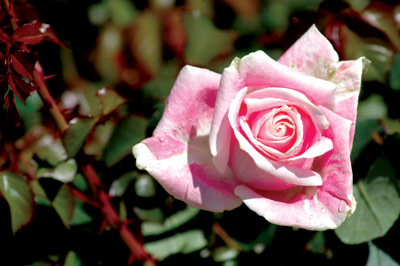A rose is just a shrub that blooms — that's it; nothing strange or difficult or mysterious about it. Roses are just plants we grow in our gardens.

And if you're waiting for the "but," there isn't one. Of course, we've all gone to our local garden center determined to buy a rose and left with a pot of Shasta daisies instead. Why? As any newbie parent can tell you, there's the baby and then there's the baby's stuff.
Roses have the same reputation. Go to buy one and you find there's the rose and then there's the rose's stuff — neatly packaged for you, dangling from the rosebush sitting pretty in its pot, its particular name spelled out in dazzling logo, just waiting for you to take it home. You're tempted: The rose is beautiful, but what is all that stuff?
It's the special fertilizers (rose food, it's called). It's the necessary pesticides (bugs dig that baby too). There are pruning instructions (got an engineer friend who could interpret for you?), and in some cases there are also the requisite shears, loppers and knives— and yes, you're also paying for the snazzy packaging.
So what about the "roses are just shrubs we grow in our gardens" idea? Simple. Most garden centers sell hybrid tea roses — the ones you see in public parks that have a squadron of gardeners to keep them going. They're also the ones you buy for your sweetheart or sick friend. They're perfect for the floral industry because their long stems are great for cutting, and refrigerated, they last long enough to still look pretty by the time your sweetheart gets them. No, the roses I'm talking about are garden roses — and garden roses are shrubs that bloom.
They're also climbers, ramblers and ground covers that bloom. In short, they are plants that can be incorporated into your overall landscape design any number of ways. They don't need a dedicated spot in your yard with the finest loamy soil or staff of rosarians. They don't come equipped with a whole bag of stuff.
They come on their own root stock (hybrid teas do not) and bloom most of the year. They can be focal points, potted, strung on pillars and arbors, planted in the shrubbery next to the azaleas, or used on that worrisome bank to help with runoff. They can even mature into trees and bloom profusely. Yes, garden roses can do all that. Before there were hybrid teas, there were garden roses, and you can grow — and, hey, even prune them without needing a horticulture degree.
The Knock-Out rose is the most famous for reminding us simple gardeners that roses can have a place in the picture. But it's not alone anymore: There are various selections reminiscent of the ones your grandmother grew. They bloomed all season, smelled divine, and she sheared them once a year without giving it too much thought.
When choosing your garden rose, pick one that's disease-resistant, likes your soil and climate, and is likely to bloom where you want it to go. Your local extension agent can tell you what zone you're in, help you determine your soil type and provide any other needed information. (Your green-thumbed neighbor can probably do the same.)
After that, just pick one you like and stick it in the ground. Do you need to fertilize it? Not really. Most garden roses are pretty hardy and can grow in some really crummy soil. Some are drought-tolerant; others favor watery areas.
Pesticides? Nope. Sure, they're going to have some pest and disease problems: All plants do. But we're not looking for perfect hybrid "show-rose" teas that can't afford a single black spot: We're looking for roses we can grow without taking out a second mortgage.
Then grab a glass of tea, have a seat on your front porch and wait for them to bloom. Isn't stopping to smell the roses what life is all about?
[Cinthia Milner gardens in Leicester.]



Before you comment
The comments section is here to provide a platform for civil dialogue on the issues we face together as a local community. Xpress is committed to offering this platform for all voices, but when the tone of the discussion gets nasty or strays off topic, we believe many people choose not to participate. Xpress editors are determined to moderate comments to ensure a constructive interchange is maintained. All comments judged not to be in keeping with the spirit of civil discourse will be removed and repeat violators will be banned. See here for our terms of service. Thank you for being part of this effort to promote respectful discussion.